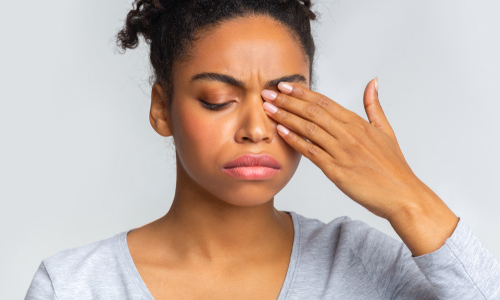
Protecting Your Eyes from Germs
Germs look for the easiest way into your body, often entering through your eyes and other mucus membranes. Fortunately, taking a few simple steps to protect your eyes may reduce your chance of developing an illness or infection.
Don't Touch Your Face
Like most people, you probably touch your face many times throughout the day without thinking about what you're doing. In fact, medical students who participated in a study at the University of New South Wales touched their faces an average of 23 times per hour. Forty-four percent of those touches involved the nose, mouth, or eyes.
If bacteria or viruses are on your hands, you'll transfer them to your eyes by touching or rubbing. Although your hands may look clean, they actually harbor more germs than you may realize. A typical hand has about 150 different species of bacteria on it, according to a University of Colorado at Boulder study.
Rubbing your eyes can also increase your risk of developing keratoconus, an eye condition that occurs when the normally round cornea becomes thin and cone-shaped. The cornea is the clear tissue covering your iris and pupil. If you develop keratoconus, your vision may become blurred and distorted.
Wash Your Hands
No matter how careful you are about keeping your hands away from your face, you're bound to forget from time to time. You'll be less likely to spread germs to your eyes if you make hand-washing a frequent habit.
Fortunately, soap and warm water will remove the germs that could make you sick. Scrub your hands and nails for at least 20 seconds to get rid of bacteria and viruses. If running water isn't available, hand sanitizer is a good option.
In addition to washing your hands after using the bathroom, wash them:
- Before and After Preparing Raw Meat, Poultry, or Fish
- After Working with Soil
- After Changing a Diaper, Helping Someone Else with Bathroom Needs, or Removing Animal Waste
- After Taking Out the Trash
- After You Blow Your Nose or Sneeze
- After Washing and Bandaging a Wound
- Before Touching Your Eyes or Using Eye Drops
- After Taking Care of Someone Who Is Ill
Clean Your Glasses
The outside of your glasses may be coated in germs, particularly if someone sneezes or coughs near you. Handling your glasses, then absentmindedly touching your eyes, will send those germs into your eyes.
Clean your glasses in the morning and evening, or after you've been around someone who has been sneezing or coughing. You don't need expensive eyeglass cleaners to remove bacteria and viruses. Soap and warm water will get rid of the germs.
Avoid Sick People
Keeping your distance from people who sneeze, cough, or mention that they don't feel well will help keep germs away from your face. If possible, stay at least six feet away from people who are ill.
Follow Contact Lens Hygiene Recommendations
Germs and viruses may also find their way into your eyes if you wear contact lenses and don't practice good hygiene. In addition to increasing your risk of illness, poor contact lens hygiene can cause potentially serious eye infections that could temporarily or permanently affect your vision.
If you wear contact lenses, be sure to:
- Wash your hands before putting in, removing, or handling your lenses.
- Clean your contact lens case every day, and refill the wells with fresh solution. (Don't just top off the solution already in the wells.)
- Replace your contact lens case every three months or as soon as it becomes cracked or damaged.
- Never use saliva to wet/clean your lenses.
- Follow your eye doctor's cleaning instructions.
- Keep the cap on solutions to prevent contamination.
- Don't wear your contact lenses while swimming.
- Replace your lenses as recommended by your optometrist.
Regular eye examinations will help you keep your eyes healthy. Contact our office if you're ready to make an appointment for your next exam.
Sources:
American Academy of Ophthalmology: How to Take Care of Contact Lenses, 3/18/20
All About Vision: Eye Germs and Viruses: Keeping Hands, Glasses and Contacts Clean, 8/20
American Academy of Ophthalmology: Eye Infections: Be Careful Now or Regret It Later, 6/24/20
Centers for Disease Control and Prevention: Frequent Questions About Hand Hygiene
